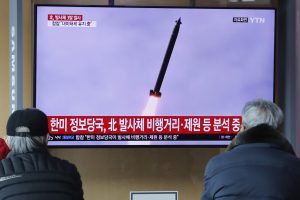As the world confronts the novel coronavirus, North Korea has been steadily moving forward with efforts to “strengthen its national defense.” Looking back on recent reporting on Chairman Kim Jong-un by North Korean media, much of it has been about “firepower strike drills,” “bombardment drills,” and other military inspections.
When inspecting the “test firing of a tactical ballistic missile” on March 21, Kim stated that “the new weapons system and the tactical and strategic weapons system under development” is a “most trustworthy war deterrent.” These comments are worth noting. In the past, North Korea claimed that it had secured an American deterrent with the six nuclear tests and three ICBM tests, but it might be that it is now considering the possibility of having to find an alternative.
In other words, it would appear that Pyongyang is starting to think that a true deterrent following any future progress in negotiations with the United States would be the capability to reliably strike at South Korea and Japan with their U.S. military bases. The “most trustworthy war deterrent” would thus represent a new threat to Japan and other neighboring countries.
North Korea’s Politburo meeting and Supreme People’s Assembly (the parliament) on April 11 and 12 produced a change in diplomatic leadership at. Ri Su-yong, director of the party’s International Relations Department, took a step back, while Kim Hyung Jun, the newly appointed chairman of the Foreign Affairs Committee, and Ri Son-gwon, who became foreign minister in January, joined the Politburo and the State Affairs Commission. Not only has North Korea’s all-important relations with the U.S. entered a stalemate, but the coronavirus issue is hindering any diplomatic headway, so the regime appears to be making preparations for the future, while keeping a watchful eye on developments with regard to the U.S. presidential elections this year.
The U.S. and North Korea have not spoken with each other since last fall, but there have been intermittent exchanges of personal letters between the two heads of state. Chairman Kim Jong-un’s younger sister Kim Yo-jung responded to a letter sent by U.S. President Donald J. Trump to the North Korean leader in March in a personal statement. Although she expressed gratitude over the letter, she cautioned that U.S.–North Korean relations should not be viewed in terms of “personal relations.”
With an eye on reelection, Trump is hoping that North Korea abstain from further “provocations.” Should Pyongyang conduct an ICBM test or something similar, Trump’s North Korea diplomacy will be seen as having failed. North Korea is well-aware of this, and so is sizing up the U.S. while resolutely avoiding any concessions itself.
One week after Kim Yo-jong’s comments, a statement attributed to the “new department director general for negotiations with the U.S.” was announced. This was the first mention of the department in North Korean media and it is thought to have been only recently formed. The statement criticized U.S. Secretary of State Mike Pompeo’s announcement of continued economic sanctions, saying that “no matter how excellent and firm the relationship between the top leaders of the two countries is, it cannot reverse the U.S. hostile policy towards the DPRK, and the resumption of dialogue much touted by the U.S. is nothing but a decoy to keep us from going our own way.” They even called it “a decoy to buy time and create the environment favorable for [the U.S. president]” that involved putting up “false propaganda for dialogue,” and warned that “If the U.S. bothers us, it will be hurt.”
However, not only was neither statement reported inside North Korea, but since the name of the “director general” criticizing the U.S. was not publicized, we can interpret this as merely a bargaining move.
But for all of the attempts that experts make at scholarly analysis, actual world history and international politics have always been swayed by unpredictable “random factors,” such as the sudden death of a leader or a natural disaster. In recent years, U.S.–North Korean relations underwent a rapid rapprochement and cooling due to the Trump factor, but now we also have a new factor in the form of the COVID-19 coronavirus. What effect it will have on diplomacy with North Korea is as yet unknown.
Atsuhito Isozaki is an associate professor at Keio University.

































